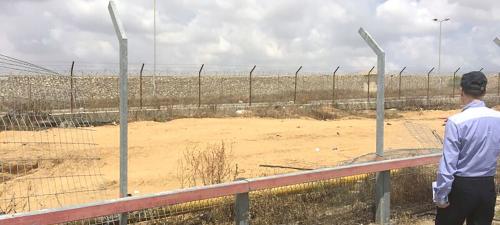UN chief welcomes re-opening of key Gaza border crossing
The decision by Israel to reopen the only functional commercial crossing point into Gaza which has been closed to most deliveries for weeks, has been welcomed by the United Nations Secretary-General.

Palestinian side of the Kerem Shalom crossing between Israel and Gaza, May 2018.
UN humanitarians expect some 400 truckloads of goods will now be able to enter Gaza after the Kerem Shalom crossing became operational on Wednesday morning; roughly a month after it was largely closed by Israel in response to attacks by Palestinians in the enclave, which is controlled by Hamas militants, and deadly mass-protests at the border fence against Israeli policies.
Israel has blockaded the Gaza Strip for more than a decade, strictly-controlling what can enter and leave the territory, including a naval blockade in the Mediterranean.
UN chief António Guterres also welcomed Wednesday’s move lift restrictions by extending Gaza’s permissible fishing area to nine nautical miles, up from six.
“He is encouraged to see that those concerned have responded to calls to avoid the devastating impact of yet another conflict on the civilian population in and around Gaza,” according to a statement issued by his spokesman.
“The Secretary-General calls on all parties to support the efforts of UN Special Coordinator Nickolay Mladenov and Egypt to avoid an escalation and address all humanitarian issues in Gaza and the return of the Palestinian Authority to Gaza.”
The Kerem Shalom crossing was closed in early July after Palestinians launched fiery kite bombs across the border into southern Israel, causing extensive property damage and heightening the threat of escalating conflict.
Only food, medical and limited fuel deliveries were allowed in.
With supplies of fuel and other essential supplies dwindling, Gaza’s two million citizens have been living through what the UN humanitarian affairs office, OCHA, has described as “an unprecedented humanitarian crisis.”
Last week, the office said that five key hospitals in Gaza might have to close, if fuel for emergency generators ran out. There was a threat that raw sewage could overflow onto the streets, due to a lack of power for treatment facilities.
Gaza’s unemployment rate is among the world’s highest, and the majority of its residents depend on aid relief to survive.
Source:United Nations
- 218 reads
Human Rights
Ringing FOWPAL’s Peace Bell for the World:Nobel Peace Prize Laureates’ Visions and Actions

Protecting the World’s Cultural Diversity for a Sustainable Future

The Peace Bell Resonates at the 27th Eurasian Economic Summit

Declaration of World Day of the Power of Hope Endorsed by People in 158 Nations

Puppet Show I International Friendship Day 2020

